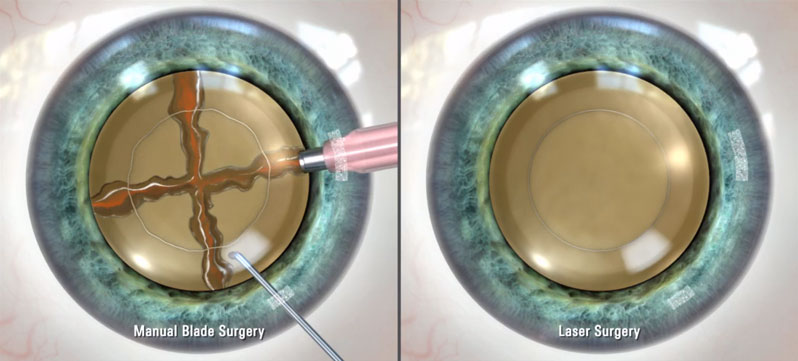Cataracts
What is unique about DLV Vision?
We offer in house Cataract surgery! No need to be referred anywhere else for your procedure.
Cataract Self-Test
What Are Cataracts?
A cataract is a clouding of the natural lens of the eye that occurs slowly as we age. Cataracts are an incredibly common occurrence- The majority of Americans have a visually significant cataract or have had cataract surgery by age 80. Every human will eventually develop cataracts if they live to be old enough.
Did you know?
- 25 million Americans have cataracts
- 90% of people will develop cataract by the age of 65
- 85% of people will have clear vision after cataract surgery
Symptoms of Cataracts
Cataracts can form in one or both eyes and can cause blurry vision. The symptoms of cataract can include blurry or hazy vision that cannot be improved with glasses, poor night vision, glare and/or halo at night, difficulty reading and yellowing of the vision.
When a cataract is causing vision loss that decreases the quality of life for a patient, many opt to regain their vision with cataract surgery.
Are you experiencing any of these symptoms?
- Vision is cloudy or hazy
- Glare/Halos at night
- Difficulty reading fine print
- Do not feel comfortable driving at night
- Colors appear faded
- Your eyeglass prescription changes often or is not working
- LASIK or previous refractive surgery is no longer working
Cataract Surgery
Cataract surgery is the most common procedure performed in the United States. Cataract surgery is more advanced than ever. The solution to cataracts is to gently remove the cloudy lens and replace it with the clear, artificial lens, called an IOL (Intraocular lens). Cataract surgery is a quick outpatient procedure that does not require an overnight stay or general anesthesia. Risk factors include age, diabetes, steroids, eye trauma, smoking, and excessive sun exposure.
The first step is to schedule a cataract exam (typically covered by your medical insurance) or free cataract surgery consultation. During this examination, you will undergo a comprehensive eye exam to examine your eye, test your vision, and discuss the options available to you.
Cataract surgery is a relatively safe and effective procedure. A high percentage of patients get significantly improved vision after cataract surgery. The risks of cataract surgery are low but exist. Your doctor will discuss this in detail prior to surgery.
During cataract surgery, your surgeon will remove the cloudy lens of your eye and replace it with an artificial lens called an Intraocular Lens (IOL) in a procedure that typically takes 7-10 minutes and is performed under topical (eyedrop) anesthesia in addition to a relaxing medication that is given by mouth or IV. Cataract surgery is typically comfortable and often results in much better vision in the first few days after surgery.

